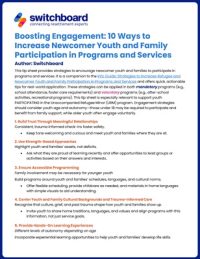This tip sheet provides strategies to encourage newcomer youth and families to participate in programs and services. It is a companion to the Info Guide: Strategies to Increase Refugee and Newcomer Youth and Family Participation in Programs and Services and offers quick, actionable tips for real-world application. These strategies can be applied in both mandatory…





